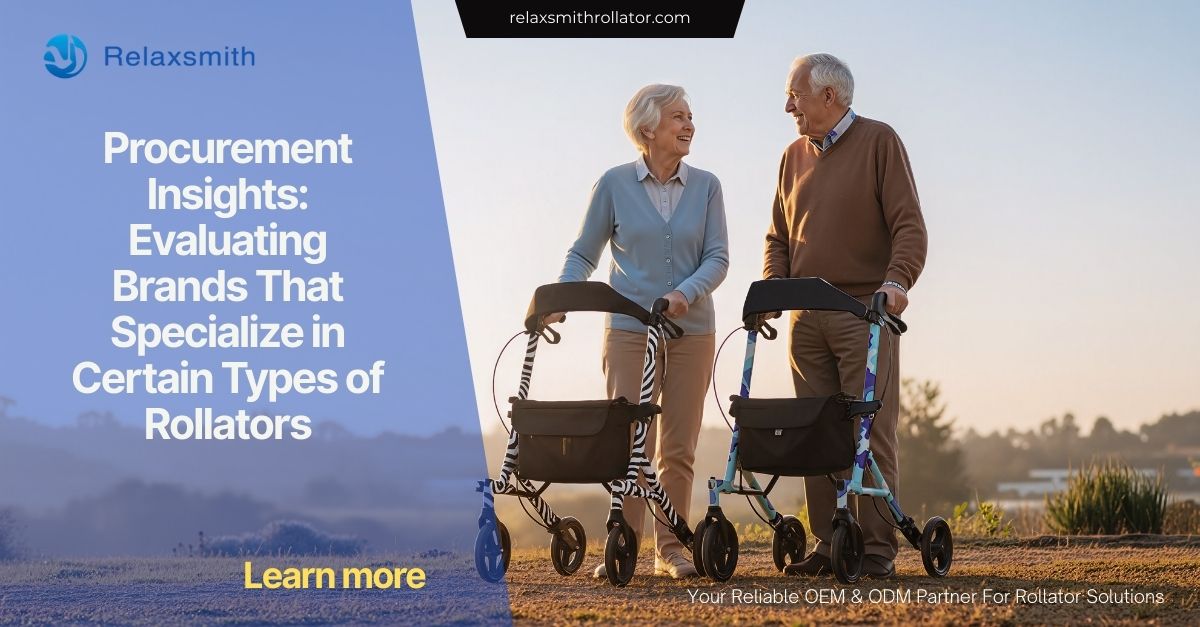Procurement Insights: Evaluating Brands That Specialize in Certain Types of Rollators

When procurement teams review suppliers of mobility aids, they often face the question: should we go with a multipurpose brand that offers lots of rollator types, or a brand that specialize in certain types of rollators? This decision impacts price, quality, lead time, maintenance, and after‑sales. Understanding how to properly evaluate specialized brands helps ensure that your choice aligns with both user needs and long‑term cost effectiveness.
1. Define Your Use Case & Requirements Precisely
Start with understanding exactly what kind of rollators your users need: indoor, outdoor, bariatric, lightweight travel, etc. Define specs like maximum user weight, terrain (smooth floors, rough pavement), frequency of use, folding/transport needs, accessory requirements. When you have crystal‑clear specs, you can evaluate how well a brand that specialize in certain types of rollators meets those specs versus a general brand that may compromise.
2. Use Supplier Scorecards & RFP Criteria
Build a structured evaluation framework. Use supplier scorecards or RFP (Request for Proposal) criteria that include factors such as: material quality, frame durability, test cycle data, lead times, cost of ownership, warranty terms, spare parts support. Supplier evaluation best practices (e.g. clarity in cost, quality, delivery) from procurement literature emphasize a scorecard approach. specialize in certain types of rollators brands tend to do better on many of these metrics within their niche because their processes, suppliers, and testing are focused.
3. Verify Testing & Durability Claims Relevant to Your Segment
Ask for independent or third‑party test reports that align with the type of rollator you're considering. For instance, if you need a bariatric rollator, look for load testing well above your expected user weight, fatigue cycling on joints, weld strength, frame sag, and corrosion exposure. If a brand only offers lightweight travel rollators, their durability tests will be different. Brands that specialize in certain types of rollators are more likely to have such targeted test data ready, compared to generalists who may provide generic or less relevant reports.
4. Assess Supply Chain & After‑Sales Support
Procurement isn’t just the initial purchase: maintenance, replacement parts, and service support matter over the lifetime of the rollator. Brands specializing in certain types often have spare parts, repair manuals, and trained support that match their niche. Also check supplier consistency, lead times for parts, and whether the supplier has stable financials and manufacturing capacity. Those are key mitigators of risk when dealing with special‑purpose designs.
5. Cost‑of‑Ownership vs Upfront Price Analysis
Upfront cost is just one part. Consider the total cost of ownership: durability (how many years or cycles before failure), maintenance, downtime, spare parts, shipping, warranty claims. A brand that specialize in certain types of rollators may cost more initially for a bariatric or rugged outdoor model, but if it lasts longer or has fewer issues, it might be more cost‑effective in the long run. Weigh these trade‑offs carefully.
6. Risk Assessment & Supplier Redundancy
Specialization involves risk: what if a key component supplier fails, or material costs spike? What if demand for your specific type drops? Procurement teams should incorporate risk assessments: supplier capacity, alternative sources, material stability, lead time fluctuations. Also consider opting for multiple suppliers to avoid dependency when dealing with niche rollator types.
7. Conclusion
Evaluating specialized rollator brands is about more than specs: it’s about matching niche performance, ensuring service, and managing long‑term value. Brands that specialize often perform better in their niche, but procurement must still verify testing, support, and supply chain robustness. By doing so, you reduce risk and select partners whose specialization delivers real advantage. Understanding why some brands specialize in certain types of rollators is key to making procurement decisions that serve users well and deliver durable, safe products.












